EU Monitor - 1 December 2022 - Contribute to EAHP’s Investigation of the Hospital Pharmacy Profession
The EAHP EU Monitor is a regular round up of news relevant to hospital pharmacy in Europe.
Help EAHP assess and advance hospital pharmacy!
 Through its membership, the European Association of Hospital Pharmacists (EAHP) has reached out to chief pharmacists, directors of pharmacy and managers of the pharmacy in each hospital across Europe to obtain their feedback on the state of play of the profession. Until the 9th of January 2023, each European hospital pharmacy can contribute to the "Investigation of the hospital pharmacy profession in Europe – Assess and advance hospital pharmacy!".
Through its membership, the European Association of Hospital Pharmacists (EAHP) has reached out to chief pharmacists, directors of pharmacy and managers of the pharmacy in each hospital across Europe to obtain their feedback on the state of play of the profession. Until the 9th of January 2023, each European hospital pharmacy can contribute to the "Investigation of the hospital pharmacy profession in Europe – Assess and advance hospital pharmacy!".
The investigation touches on the state-of-the art of the profession and specifically on the European Statements of Hospital Pharmacy. Chief pharmacists, directors of the pharmacy and managers of the pharmacy are encouraged to participate, but they can also delegate the provision of feedback to another pharmacist in their hospital pharmacy. Only one response per hospital pharmacy is needed.
Sharing your feedback on the investigation should take approximately 45 minutes. The full set of questions is available in PDF format on EAHP's website.
Access the questions HERE
Participate in the Investigation HERE
#EAHP2023 – Join us in Lisbon
 There are a little bit more than 100 days left until hospital pharmacists from all across the world will come together for EAHP's annual Congress. Hosted this time in Lisbon, Portugal the profession will be coming together from the 22nd to the 24th of March 2023 for the 27th edition of EAHP's congress.
There are a little bit more than 100 days left until hospital pharmacists from all across the world will come together for EAHP's annual Congress. Hosted this time in Lisbon, Portugal the profession will be coming together from the 22nd to the 24th of March 2023 for the 27th edition of EAHP's congress.
The Scientific Committee has put together an outstanding programme centring around the theme "From drug design to treatment success – What really matters to patients?". Three keynotes will focus on the opportunities for personalised medicine, improvements in the communication of risks and benefits to patients and patient involvement in pharmacy practice research. Medication safety, compounding, communication, patient involvement, procurement, shortages and digitalisation are some of the topics covered by the different interactive sessions. Those registering for EAHP's Congress before the end of January will be able to benefit from a reduced registration rate.
Register for EAHP's 27th Congress HERE
Follow us on Twitter, Facebook, Instagram, and LinkedIn to stay up-to-date with the latest news from #EAHP2023
Joint Statement on the Revision of the Pharmaceutical Legislation
 In November EAHP joined forces with fifteen associations representing healthcare providers, patients, healthcare professionals and payers to release a joint statement touching on the
In November EAHP joined forces with fifteen associations representing healthcare providers, patients, healthcare professionals and payers to release a joint statement touching on the
revision of the general pharmaceutical legislation.
The signatories of this joint statement underlined that enhancing patients' access to high-quality and affordable medicinal products across the European Union while preserving the financial sustainability of healthcare systems should be the overarching aim of the current revision of the general pharmaceutical legislation. To achieve this aim, the general pharmaceutical legislation should:
- Foster affordability to improve access to high-quality medicinal products,
- Improve the assessment and evidence requirement of medicinal products' effectiveness and safety, and
- Ensure a sufficient supply of medicinal products and combat shortages.
EAHP, AIDES, the Association of European Cancer Leagues (ECL), Consilium Scientific, the European Hospital and Healthcare Federation (HOPE), the European Public Health Alliance (EPHA), Global Health Advocates (GHA), the International Association of Mutual Benefits Societies (AIM), NoGracias, the Pharmaceutical Accountability Foundation, the Pharmaceutical Group of the European Union (PGEU), Prescrire, Salud por Derecho, the Standing Committee of European Doctors (CPME), The European AIDS Treatment Group (EATG) and Wemos call on the European Commission to include the considerations that have been put forward in this joint statement in the revision of the general pharmaceutical legislation.
Read the joint statement HERE
Digital Medication Management in Healthcare Settings
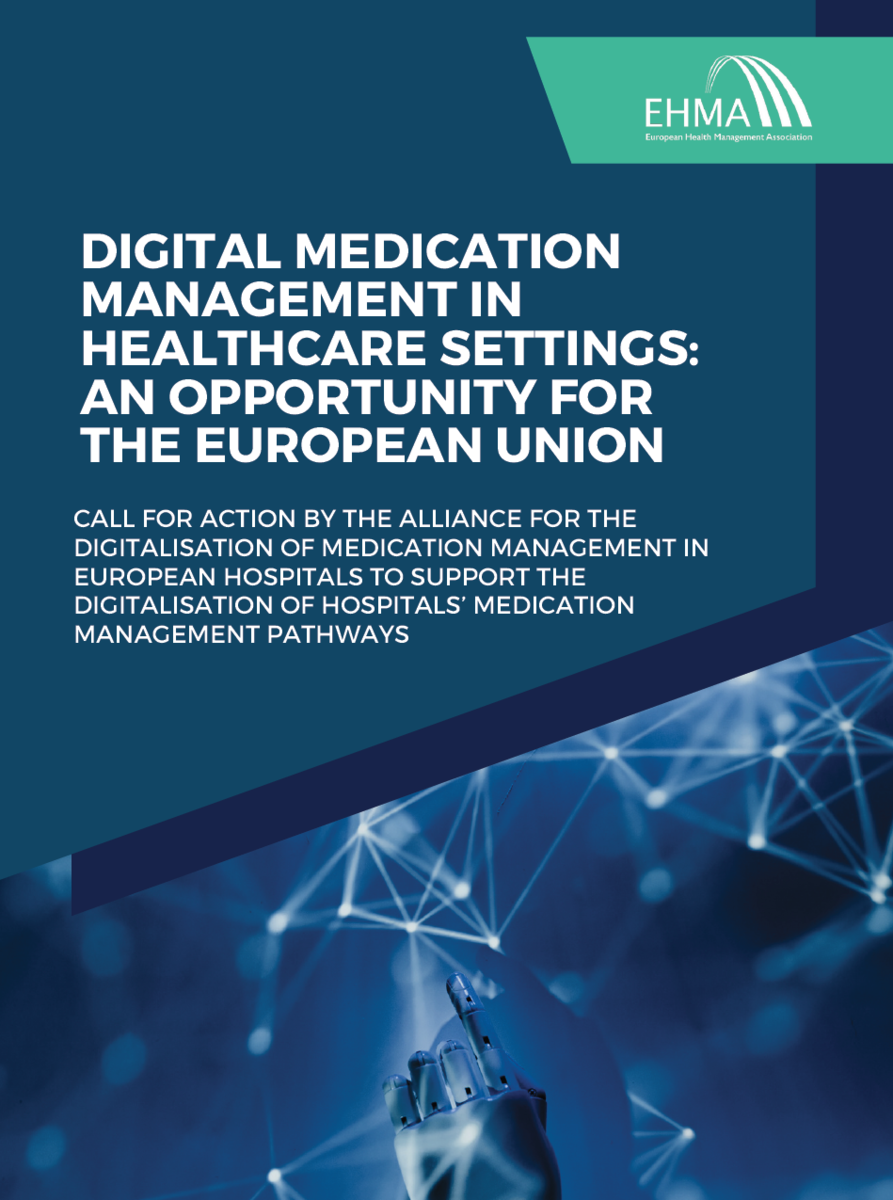 On the 29th of November, health managers, patients, healthcare professionals and the medical technology industry joined forces under the Alliance for the Digitalisation of Medication Management in European Hospitals to issue recommendations to the European Commission, the European Parliament and the Member States on fostering the digitalisation of medication management. EAHP Vice President Darija Kuruc Poje participated in a lively discussion in the European Parliament.
On the 29th of November, health managers, patients, healthcare professionals and the medical technology industry joined forces under the Alliance for the Digitalisation of Medication Management in European Hospitals to issue recommendations to the European Commission, the European Parliament and the Member States on fostering the digitalisation of medication management. EAHP Vice President Darija Kuruc Poje participated in a lively discussion in the European Parliament.
The White Paper provides insights into the complexity of hospitals' medication management pathways and shares evidence of the low penetration of digitalisation in this field. There are several benefits of upscaling the digitalisation of hospitals' medication management pathways, namely improving the resilience of hospital systems and increasing their capabilities, providing access to more reliable information about the availability of medicines, ensuring access to real-world data in interoperable systems and supporting antimicrobial stewardship.
The Alliance calls for action from European policy makers to
- Support the implementation of electronic medication management systems in EU hospitals as a critical success factor and key digital enabler for the effective, and efficient, functioning of the future European Shortages Monitoring Platform.
- Include in the future Digital Europe work programmes specific objectives supporting hospitals to update their IT infrastructure for the digitalisation of the medication management pathway.
- Include in the 2023 EU4Health work programme a specific funding mechanism, incorporating support for change management and building cultures of safety in hospitals, to support member states to implement digitised medication management systems in hospitals.
- Support the development of digital skills of the EU's health workforce and ensure that trained experts will support change management to implement the digital transition of European hospitals with sustained investments from the EU4Health Programme.
- Include medication treatment data from ambulatory care and hospitals as key data to be generated and shared by Member States within the European Health Data Space. Standardise medication treatment data collection within interoperable systems by introducing digital medication management systems in ambulatory care and hospital settings.
- Include a measure recommending the digitalisation of hospitals' medication management pathways to enhance patient safety and the resilience of hospitals' pharmaceutical systems within the new pharmaceutical legislative framework.
Read the White Paper HERE
Preventing Antimicrobial Resistance Together
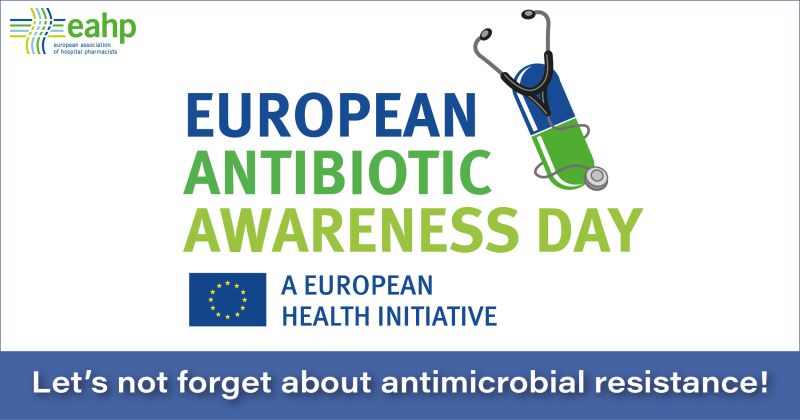 This year's World Antimicrobial Awareness Week (WAAW) kicked off on the 18th of November which also marks the date of the European Antibiotic Awareness Day (EAAD). Under the theme "Preventing Antimicrobial Resistance Together" healthcare professionals, patients, supply chain actors and other stakeholders came together to raise awareness around this silent pandemic.
This year's World Antimicrobial Awareness Week (WAAW) kicked off on the 18th of November which also marks the date of the European Antibiotic Awareness Day (EAAD). Under the theme "Preventing Antimicrobial Resistance Together" healthcare professionals, patients, supply chain actors and other stakeholders came together to raise awareness around this silent pandemic.
On the occasion of EAAD, the European Centre for Disease Prevention and Control (ECDC) released new data on antibiotic consumption showing a decrease in the total antibiotic consumption in humans by more than 15% between 2019 and 2020. This has been seen in most EU/EEA countries, mostly in primary care, and most likely as a result of the COVID-19 pandemic. Nevertheless, ECDC stressed that antimicrobial resistance levels remain high for several important combinations of bacterial species and antimicrobial groups, with the highest percentages generally reported by countries in the south and east of Europe. By contrast, the number of deaths attributable to infections with antimicrobial-resistant bacteria has risen. According to estimates, more than 35 000 people die from antimicrobial-resistant infections in the EU/EEA each year.
EAAD is a European health initiative coordinated by European Centre for Disease Prevention and Control (ECDC). It provides a platform and support for national campaigns on the prudent use of antibiotics in the EU/EEA and takes place each year across Europe. Also for the 15th edition of the EAAD, healthcare professionals around Europe were encouraged to produce social media content around the prudent use of antibiotics. Like every year, EAHP contributed with a social media campaign focusing on the importance of antibiotic stewardship teams and encouraged its members to share how they keep antibiotics working.
Access the antibiotic consumption report for 2020 HERE
Read the report assessing the health burden of infections with antibiotic-resistant bacteria HERE
Learn more about EAAD 2022 HERE
EMA/HMA joint statement on the scientific rationale supporting interchangeability of biosimilar medicines in the EU
 The European Medicines Agency (EMA) and the Heads of Medicines Agencies (HMA) issued a joint statement confirming that biosimilar medicines approved in the European Union are interchangeable with their reference medicine or with an equivalent biosimilar. This joint statement brings more clarity for healthcare professionals and consequently will improve patients' access to biological medicines across the EU.
The European Medicines Agency (EMA) and the Heads of Medicines Agencies (HMA) issued a joint statement confirming that biosimilar medicines approved in the European Union are interchangeable with their reference medicine or with an equivalent biosimilar. This joint statement brings more clarity for healthcare professionals and consequently will improve patients' access to biological medicines across the EU.
Since 2006, EMA has been at the forefront of biosimilar medicines and so far, has approved 86 of them. EMA's position is based on the experience gained in clinical practice, where it has become common that doctors switch patients between different biological medicinal products. Approved biosimilars have demonstrated similar efficacy, safety and immunogenicity compared with their reference medicines, and analysis of more than one million patient-treatment years of safety data did not raise any safety concerns. Thus, EU experts considered that when a biosimilar is granted approval in the EU, it can be used instead of its reference product (or vice versa) or replaced by another biosimilar of the same reference product. Decisions regarding substitution at pharmacy-level (the practice of dispensing one medicine instead of another without consulting the prescriber) are managed by individual Member States. EMA plans to update its communication materials on biosimilars for patients and healthcare professionals to integrate the new joint statement.
Learn more HERE
Global Health Strategy released
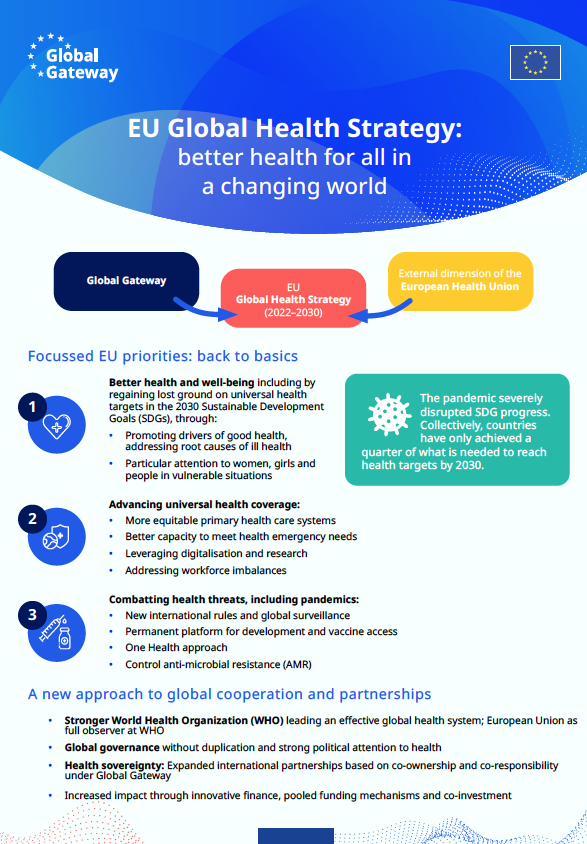 Yesterday, the European Commission published its new EU Global Health Strategy which focuses on improving global health security and delivering better health for all in a changing world. It positions global health as an essential pillar of EU external policy, a critical sector geopolitically and central to EU strategic autonomy.
Yesterday, the European Commission published its new EU Global Health Strategy which focuses on improving global health security and delivering better health for all in a changing world. It positions global health as an essential pillar of EU external policy, a critical sector geopolitically and central to EU strategic autonomy.
The new EU Global Health Strategy – applicable from 2022 to 2023 – puts forward three key interrelated priorities in dealing with global health challenges:
- deliver better health and well-being of people across the life course;
- strengthen health systems and advance universal health coverage;
- prevent and combat health threats, including pandemics, applying a One Health approach.
Also, a new approach to global cooperation will be pursued. Stronger ties with the World Health Organization (WHO) with the European Union as a full observer at WHO is being fostered. Global governance without duplication and strong political attention to health is being pushed for and international partnerships based on co-ownership and co-responsibility under Global Gateway are being expanded.
Learn more about the EU's Global Health Strategy HERE
European Health Union: Adoption of EU4Health work programme 2023
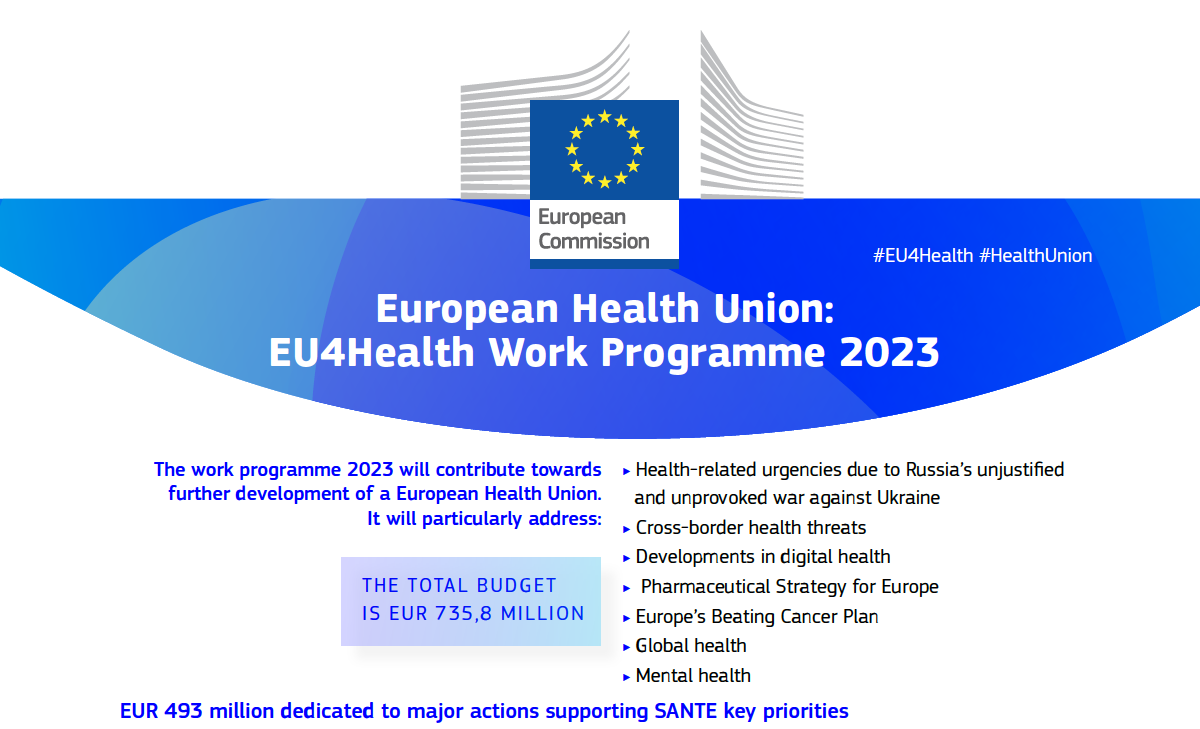 In November, the European Commission adopted the 2023 EU4Health work programme. Actions that will be prioritised by the programme link to the strengthening of the EU's resilience to cross-border health threats, the implementation of the European Health Data Space, the Pharmaceutical Strategy for Europe and Europe's Beating Cancer Plan, as well as financing for the European Reference Networks. The work programme will also support health-related urgencies in Ukraine.
In November, the European Commission adopted the 2023 EU4Health work programme. Actions that will be prioritised by the programme link to the strengthening of the EU's resilience to cross-border health threats, the implementation of the European Health Data Space, the Pharmaceutical Strategy for Europe and Europe's Beating Cancer Plan, as well as financing for the European Reference Networks. The work programme will also support health-related urgencies in Ukraine.
With a €5.3 billion budget during the 2021-27 period, the EU4Health programme is an unparalleled EU financial support in the health area. It will bring a contribution to long-term health challenges by building stronger, more resilient and more accessible health systems.
Learn more about the work programme for 2023 HERE
EJHP: Digitalisation of the drug prescribing process in Swiss hospitals – results of a survey
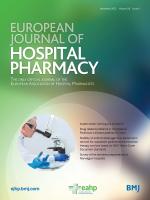 The online first edition of the European Journal of Hospital Pharmacy (EJHP) recently published the results of a survey focused on digitalisation in Swiss hospitals. The survey was conducted to understand which electronic systems are implemented to support doctors in Swiss hospitals during the medication prescribing process, in particular since digitalisation seems to be lagging, even as the national electronic health record is being gradually implemented. The results showed that the digitalisation of the medical prescribing process in Swiss hospitals has progressed over the last decade. Drug prescriptions via electronic prescribing systems were introduced in most hospitals. However, the survey suggests that the current use of clinical decision support systems is far from exhausted and that clinical drug information data could be maintained more efficiently. Optimising electronic support for healthcare professionals during the prescribing process still has considerable potential.
The online first edition of the European Journal of Hospital Pharmacy (EJHP) recently published the results of a survey focused on digitalisation in Swiss hospitals. The survey was conducted to understand which electronic systems are implemented to support doctors in Swiss hospitals during the medication prescribing process, in particular since digitalisation seems to be lagging, even as the national electronic health record is being gradually implemented. The results showed that the digitalisation of the medical prescribing process in Swiss hospitals has progressed over the last decade. Drug prescriptions via electronic prescribing systems were introduced in most hospitals. However, the survey suggests that the current use of clinical decision support systems is far from exhausted and that clinical drug information data could be maintained more efficiently. Optimising electronic support for healthcare professionals during the prescribing process still has considerable potential.
Read the article HERE

Are you familiar with the commented version of the European Statements?
One year ago, EAHP published the commented version of its European Statements of Hospital Pharmacy. The commented version provides additional information for some of the Statements to further clarify their meaning. If you are curious about the commented version of the European Statements, have a look at it HERE




